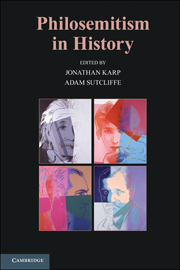Book contents
- Frontmatter
- Contents
- Notes on Contributors
- Introduction
- PART I MEDIEVAL AND EARLY MODERN FRAMEWORKS
- PART II THREE EUROPEAN PHILOSEMITES
- 4 William Whiston's Judeo-Christianity
- 5 A Friend of the Jews?
- 6 Ordinary People, Ordinary Jews
- PART III THE CULTURAL POLITICS OF PHILOSEMITISM IN VICTORIAN BRITAIN AND IMPERIAL GERMANY
- PART IV AMERICAN PHILOSEMITISMS
- PART V PHILOSEMITISM IN POST-HOLOCAUST EUROPE
- Index
- References
4 - William Whiston's Judeo-Christianity
Millenarianism and Christian Zionism in Early Enlightenment England
Published online by Cambridge University Press: 05 June 2012
- Frontmatter
- Contents
- Notes on Contributors
- Introduction
- PART I MEDIEVAL AND EARLY MODERN FRAMEWORKS
- PART II THREE EUROPEAN PHILOSEMITES
- 4 William Whiston's Judeo-Christianity
- 5 A Friend of the Jews?
- 6 Ordinary People, Ordinary Jews
- PART III THE CULTURAL POLITICS OF PHILOSEMITISM IN VICTORIAN BRITAIN AND IMPERIAL GERMANY
- PART IV AMERICAN PHILOSEMITISMS
- PART V PHILOSEMITISM IN POST-HOLOCAUST EUROPE
- Index
- References
Summary
Jews and Judaism played a crucial role in the thinking of William Whiston (1667–1752), disciple and popularizer of Isaac Newton, millenarian pamphleteer, Josephus translator, coffeehouse lecturer, and antitrinitarian heretic. Although hardly known today except to specialists in the religious politics and the scientific achievements of early eighteenth-century England, Whiston was a well-known figure to the eighteenth-century reading public. During his long life, Whiston published more than seventy books and pamphlets on topics including early Christian theology, ecclesiastical history, navigation, astronomy, geology, and mathematics. Whiston carried on vigorous polemics in print with contemporaries on many topics, mainly religious, and revisited his long career in a two-volume autobiography published three years before his death. Whiston, one of Newton's prominent students at Cambridge in the 1690s, succeeded his teacher as Lucasian Professor in 1702. During this same period, Whiston's emerging interest in primitive Christianity led him to adopt an antitrinitarian view of Christianity. His understanding of Jesus as a nondivine teacher and Messiah was reminiscent of theological views common in the early church that had been declared heretical by the Council of Nicea in 325 c.e. and was anathema to the established Church of England. When Whiston publicly preached (and then published) his “Arian” view, he was put on trial for heresy and was exiled from Cambridge in 1710. After his expulsion, he moved to London and remained a well-known lecturer and author until his death.
- Type
- Chapter
- Information
- Philosemitism in History , pp. 93 - 110Publisher: Cambridge University PressPrint publication year: 2011
References
- 3
- Cited by

